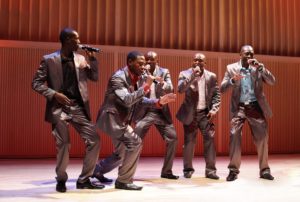Report from the Tampere Vocal Music Festival
By Andrea Angelini, ICB Managing Editor and Choral Conductor
When the plane starts to descend from the clouds and thus the unaware passenger begins to see the ground, one wonders why the pilot decided to land among the trees … Finland, seen from above, looks like green scrub, dotted with some blue puddles – the thousands of lakes. Many centuries ago man decided to clear some of that tree heritage to build a few cities. Suddenly the roofs of Tampere vanish and the plane touches down on a rough runway, made to withstand cold winters. This is my first encounter with the “Tampere Vocal Music Festival” or, as they say in the local language, the “Tampereen Sävel”.

Tampere is one of those places that should be invented if it did not exist! For someone like me, accustomed to the chaos of Italian cities, or to the mad rush in cities I encountered during a recent trip to Asia, the peace that reigns among its streets reconciles you with the world. One meets Finnish design, real national pride, everywhere: houses with clean lines, never bold colors, people always polite and not noisy. And what about the theater building which hosts all the concerts, competitions and workshops? How many small to medium-sized cities such as Tampere can boast such a jewel of architecture and miracle of sound? Imagine a building surrounded by a magnificent park, the external walls made of metal and crystal and internally lined with wood! Think about the most effective technological solutions and, at the same time, of the respect for human beings! It would be nice if at least one fault in this building came to mind ….
While I was walking in the theater foyer wondering what could be the reason for holding a Choir Festival here where nature herself sings, Jussi Chydenius, the Artistic Director of the Tampereen Sävel, came to talk to me, telling me about the origins of the Festival, and thereby answering quite a big part of that question I had been asking myself. “The Festival started in the 1980s. So it has been going on longer than I have been involved in the event. The core of the Festival is the ‘Choral Review’ for which we have choirs from all over the world coming here to sing for a jury made up of very well-known choral specialists, and getting feedback. It’s not a competition”.

It is really a good idea to have a festival where choirs are not always under pressure! Receiving feedback from a qualified jury may sometimes help more than just getting a cold score without any explanation as to why that score was given. By the way: there is a competition, too, but it is limited to the vocal ensembles that are also here to find an international stage for their work, and it is much more oriented towards the professional world than to amateur activity. Jussi confirms what I had been guessing, and finds time for some memories too. “Exactly! We do also have a competition for vocal groups, which is a true competition, which obviously attracts another group of people to come to the Festival. I mean, most of the people who attend the Festival are members of the choirs and the vocal groups. And then of course we have serious concerts, workshops during the four, five days. I was involved with the Festival for the first time as a choral singer twenty years ago; that year, 1991, I was here for the first time with the Chamber Choir in which I used to sing, Grex Musicus from Helsinki. I will come here – I thought back then – many times because this is the major Choral Festival in Finland. And then, in 1999, the vocal group in which I also sang, Rajaton, came and took part in the Competition for vocal groups and we won, which was a great surprise. We had only been together for a year, and our only reason to come had been to get feedback from the jury and gain experience”.
The staff of the Festival is really thoughtful and well-organized. The hotel where we stayed is only a few hundred meters from the theater, and there are plenty of restaurants nearby. While I have dinner with Jean-Claude Wilkens (who was also a guest of the Festival) with the sun still high, I am reminded that we are in the middle of the Nordic summer: Finland is a country of opposites, of course: for as many hours of light we have now, so much will there be darkness during the long winter. So it is understandable that we saw young people lying in the parks to soak up the last rays of the sun at 11 pm!
This year a particularly large number of groups and choirs of an amazingly high standard attended the Festival! Particularly interesting, in my opinion, were the “Postyr Project” from Denmark (which won first prize) and the French “Egregor Vocal”. I won’t bore you with details of the final rankings because they are readily available at the following address: http://alturl.com/zdvb5

The most interesting project of the Festival was without doubt the fact that it featured the Finnish composer Erik Bergman (1911-2006), on the centenary of his birth. Erik Bergman’s career resembles a radiant flame that swept through Finnish music history of the twentieth century. It smoulders and it sizzles. “This composer has had a career history that uniquely connects with the alternating spirits of an entire century”, wrote his composer friend Paavo Heininen in the celebratory program leaflet printed in honour of Bergman’s 90th birthday. In his early works Erik Bergman was a romanticist. However, come the 1950s, he resolutely shook off his previous compositional styles. The music scene witnessed the entry of a modernist who knew how to make use of modern tools including the twelve-tone technique, serialism and aleatoric composition. Erik applied the tools in this toolbox without making any compromises. In the 1960s he was known as an enfante terrible, but a certain maturity in the 1970s gave him the status of a renowned expert on distant cultures and their musical traditions.
Music and choral tradition in Finland … I must be careful to express myself well. I’m not sure where exactly it can be placed … Finland is neither a Scandinavian nor a Baltic Country; Jussi, very seriously, says: “This is truly a tricky question due to the political situation in the last seventy years after the Second World War. Finland lies between the Soviet Union, Sweden and the Baltic Countries (which were part of the Soviet Union). Culturally I think Estonia is closest to Finland because the language is similar. In general I think obviously there are a lot of folk music influences in all kinds of jazz, classical music and so on. Finland is not part of Scandinavia; the right term is “Nordic Countries” meaning Scandinavia, Finland and Iceland. As I said: we are closer to Estonia. There is talk about building a tunnel between Helsinki and Tallinn. We have a lot of Estonian people that work in Finland”.
I reflect on this last topic, that of Finnish musical tradition, while the plane that takes me back to Helsinki is still high above the lakes and the endless forests. Now I am sure where Bergman and his fellow composers found their ideas and the resources to translate their emotions into music. Easy to understand, is it?
Andrea Angelini. Email: aangelini@ifcm.net
Tampere Vocal Music Festival: www.tamperemusicfestivals.fi
Edited by Irene Auerbach, UK

